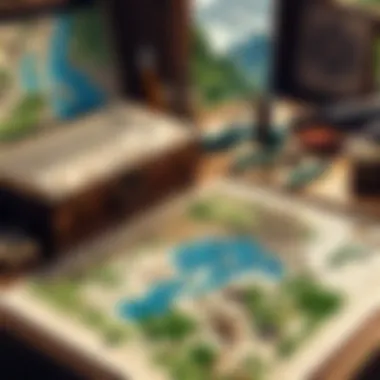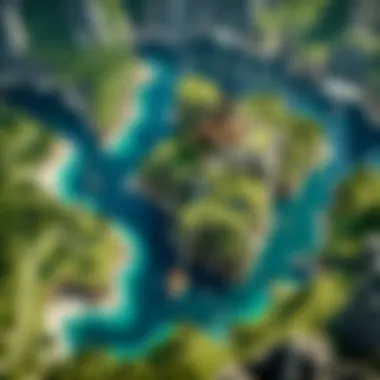Exploring Cartographer Job Opportunities Near Your Location


In the domain of cartography, a fascinating realm unfolds, offering a myriad of opportunities for those inclined towards mapmaking and geographical analysis. As you navigate through the landscape of cartographer jobs near you, a world enriched with possibilities unveils itself. The intricacies and nuances of roles in cartography await your discovery, promising a fulfilling and intellectually stimulating career path.
Minecraft Game Guides
Delving into the specifics of cartographer jobs near you, it becomes imperative to understand the core aspects that define this field. Analyzing the key requirements, responsibilities, and skills demanded in cartography roles provides a foundational knowledge for those venturing into this realm. Exploring the essential techniques, tools, and software utilized by cartographers unveils the depth of expertise required to excel in this profession.
Latest Updates and Patch Notes
Amidst the evolving landscape of cartography, staying abreast of the latest developments and advancements is crucial. Diving into the patch notes of the cartography industry sheds light on the innovative practices, emerging technologies, and cutting-edge methodologies employed by modern cartographers. Analyzing new features, biome updates, and advancements in world generation presents a comprehensive view of the dynamic nature of cartography roles near you.
Mod Reviews and Recommendations
As you embark on your exploration of cartographer jobs near you, delving into the realm of mod reviews and recommendations can enhance your understanding of this field. Uncovering the top mods of the month, exploring mod spotlight series, and following mod installation guides offer valuable insights into the customization and optimization possibilities within cartography. By immersing yourself in the world of cartography mods, you pave the way for a nuanced and enriched cartography experience.
Minecraft News and Developments
Tracking the pulse of the cartography industry involves delving into the latest news, trends, and developments shaping the field. Exploring industry updates, gaining behind-the-scenes insights into upcoming features, and unraveling sneak peeks into the future of cartography provide a holistic perspective on the trajectory of this profession. Engaging with the community speculations and theories surrounding cartography offers a rich tapestry of perspectives and forecasts, enriching your journey into the realm of cartographer jobs near you.
Introduction
In the realm of mapping and spatial analysis, cartographers play a pivotal role in shaping how we perceive and interact with our surroundings. Understanding the intricacies of cartography not only offers insights into geographic information systems but also unlocks a world of opportunities for those intrigued by maps and data visualization. This article serves as a guiding light, illuminating the path toward local cartographer jobs and unearthing the rich tapestry of possibilities awaiting aspiring mapmakers near you.
Understanding Cartographer Jobs
Defining Cartography
Delving into the essence of cartography unveils a sophisticated blend of art and science dedicated to crafting maps that transcend mere navigation. The art of cartography encapsulates a meticulous process of map design, synthesis of geospatial data, and visual storytelling. By intricately weaving together cartographic elements like scale, symbology, and projection, cartographers breathe life into static landscapes, offering a dynamic lens through which to interpret the world around us. The allure of defining cartography lies in its ability to amalgamate geography, design, and technology into a cohesive tapestry that communicates complex spatial information with precision and clarity.
Importance of Cartographers
Within the realm of geographic information systems (GIS) and mapping, cartographers stand as vanguards of spatial analysis, aiding in decision-making across various industries. The importance of cartographers transcends map creation; these skilled professionals elucidate spatial patterns, identify trends, and facilitate data-driven insights crucial for strategic planning and resource management. Cartographers bridge the gap between raw geospatial data and meaningful visualization, empowering stakeholders to make informed choices based on spatial relationships and distributions. The significance of cartographers lies in their ability to transform raw data into actionable knowledge, paving the way for informed spatial decision-making.
Scope of the Article


Focus on Local Cartographer Opportunities
Zooming in on the local landscape of cartographer opportunities unravels a myriad of potential career pathways for discerning map enthusiasts. Focusing on local cartographer opportunities sheds light on the diverse array of industries seeking spatial expertise, ranging from urban planning and environmental management to telecommunications and emergency services. By honing in on local opportunities, aspiring cartographers can navigate the regional job market with tailored precision, aligning their skill set with the specific demands of nearby industries hungry for spatial insights.
Navigating the Job Market Near You
Navigating the labyrinth of the job market near you entails a strategic approach to uncovering hidden cartographic gems amidst a sea of online job platforms and physical job centers. By leveraging digital resources and seizing networking opportunities within the cartography community, navigating the job market near you becomes an exploratory journey filled with potential connections and serendipitous discoveries. Armed with a discerning eye for local cartographer roles, aspiring mapmakers can steer their career trajectory towards fulfilling and impactful roles within arm's reach, optimizing their chances of securing coveted positions in their geographic vicinity.
Exploring Cartography Careers
In this section, we will delve into the significance of exploring cartography careers within the context of this article. Understanding the various aspects of cartography professions is crucial for individuals seeking to venture into this field. By exploring cartography careers, readers will gain insights into the diverse job opportunities available in the realm of map-making and geographic information systems. Through a detailed exploration of the different types of cartographer roles, qualifications required, and essential skills, this section aims to equip aspiring cartographers with the knowledge needed to navigate this specialized industry effectively.
Types of Cartographer Jobs
GIS Cartographer
GIS cartographers play a pivotal role in utilizing geographic information systems to create and analyze maps for various applications, ranging from urban planning to environmental monitoring. The key characteristic of a GIS cartographer lies in their adeptness at integrating spatial data to generate accurate and informative maps. GIS cartography is highly sought after due to its capability to provide real-time geographic insights, making it an invaluable asset in decision-making processes. However, the complexity of GIS software tools can pose a challenge to beginners in this field.
Topographic Cartographer
Topographic cartographers specialize in mapping terrain features, including elevation, forests, and bodies of water. Their meticulous attention to detail and ability to interpret topographic data sets them apart in the field of cartography. The unique feature of a topographic cartographer lies in their emphasis on capturing precise topographic information essential for infrastructure development and natural resource management. While topographic cartography offers a comprehensive perspective on land characteristics, the time-intensive nature of producing topographic maps can be a drawback.
Remote Sensing Cartographer
Remote sensing cartographers leverage satellite imagery and aerial photographs to collect data for mapping purposes. Their expertise in analyzing remote sensing data allows them to map large areas efficiently. The key characteristic of a remote sensing cartographer is their proficiency in interpreting remotely sensed imagery to extract valuable geospatial information. Remote sensing cartography stands out for its ability to conduct large-scale mapping projects swiftly. However, the reliance on external data sources can sometimes lead to inaccuracies in mapping outputs.
Qualifications and Skills
Educational Requirements
A solid educational background in geography, geomatics, or cartography is vital for aspiring cartographers. Understanding spatial relationships and having knowledge of geospatial technologies are key aspects of educational requirements. This foundation enables cartographers to effectively interpret maps and spatial data, essential for producing accurate mapping products. While formal education provides a theoretical framework, hands-on experience and practical training are equally important for honing cartographic skills.
Technical Proficiency Needed
Technical proficiency plays a critical role in the cartography industry, with skills in GIS software, remote sensing technologies, and data analysis being prerequisites for cartographer roles. The key characteristic of technical proficiency lies in the ability to manipulate geospatial data and generate visually appealing maps. Mastering technical tools such as ArcGIS, QGIS, and ENVI enhances a cartographer's ability to create detailed and informative maps. However, staying abreast of evolving technologies and industry trends is essential to remain competitive in the cartography job market.


Job Responsibilities
Map Production
Map production is a fundamental aspect of cartographer responsibilities, involving the creation of thematic maps, topographic maps, and customized mapping products. The key characteristic of map production is the meticulous attention to detail required to ensure map accuracy and readability. Cartographers employ cartographic techniques to symbolize data effectively and present spatial information in a clear and concise manner. While map production allows cartographers to showcase their creativity in map design, meeting project deadlines and adhering to client requirements can be challenging.
Data Analysis
Data analysis is a core component of cartographer roles, involving the interpretation and manipulation of spatial data to derive meaningful insights. The key characteristic of data analysis is the ability to extract actionable information from geospatial datasets to support decision-making processes. Cartographers use statistical methods and geospatial tools to analyze trends, patterns, and relationships within spatial data sets. While data analysis empowers cartographers to unveil hidden patterns in geographic data, handling large datasets and ensuring data accuracy are primary concerns in this aspect of the job.
GIS Software Utilization
GIS software utilization is a critical skill for cartographers, enabling them to create, edit, and analyze spatial data efficiently. The key characteristic of GIS software utilization is the ability to leverage GIS tools to perform spatial queries, overlay maps, and visualize geographic information effectively. Cartographers utilize GIS software to geocode addresses, conduct spatial analysis, and generate thematic maps. While GIS software enhances cartographic workflow and simplifies map production, mastering complex GIS functionalities can require continuous learning and upskilling.
Finding Cartographer Roles Nearby
In this segment, we delve into the crucial aspect of finding cartographer roles in your vicinity, shedding light on the various avenues available to aspiring cartographers to kickstart their careers. It is imperative to recognize the significance of being aware of local opportunities in the cartography field. Identifying nearby cartographer roles can provide a strategic advantage by enabling individuals to access relevant job listings and networks that may not be evident on a broader scale, ultimately enhancing their chances of securing a position that aligns with their professional aspirations.
Local Job Boards and Listings
Utilizing Online Platforms
When it comes to exploring cartographer roles near you, utilizing online platforms emerges as a pivotal strategy. Online platforms such as job portals and professional networking sites offer a convenient and efficient way to discover job openings in the cartography domain. The key characteristic of utilizing online platforms lies in the vast array of job listings and networking opportunities they present. These platforms serve as a beneficial choice for individuals looking to narrow down their job search to specific locations or companies, enabling them to streamline their application process. One unique feature of utilizing online platforms is the real-time updates on job postings, facilitating immediate access to newly listed opportunities. However, it is essential to exercise caution and verify the credibility of job postings on online platforms to avoid potential scams or misleading information.
Exploring Physical Job Centers
In the quest for cartographer roles nearby, exploring physical job centers can also play a significant role. Physical job centers provide a hands-on approach to job hunting by offering in-person assistance and resources to navigate the local job market effectively. The key characteristic of physical job centers lies in their personalized assistance tailored to individuals seeking employment in specific geographic areas. This personalized approach makes them a popular choice for job seekers looking for localized job opportunities. One unique feature of exploring physical job centers is the face-to-face interaction with job counselors, which can provide valuable insights and guidance not always available through online platforms. While physical job centers offer the advantage of in-depth guidance and support, they may have limitations in terms of the range of job listings compared to online platforms.
Applying for Cartographer Positions
In the realm of cartographer jobs, the process of applying for positions holds significant importance as it is the gateway to establishing oneself in this specialized field. When considering the specific elements of applying for cartographer positions, it is vital to highlight one's expertise in map production, data analysis, and GIS software utilization. These skills serve as the foundation for success in the cartography domain, where meticulous attention to detail and technical proficiency are highly valued.
Crafting a compelling cartographer resume plays a crucial role in differentiating oneself from other applicants. Highlighting relevant skills involves showcasing proficiency in mapping techniques, geographical information systems (GIS), and spatial analysis. By emphasizing these competencies, applicants can demonstrate their suitability for roles that demand precision, analytical thinking, and a deep understanding of geographic data.


Similarly, showcasing mapping experience is paramount in illustrating practical knowledge and hands-on expertise in cartography. Applicants should detail their involvement in diverse mapping projects, including the creation of maps for various purposes such as urban planning, environmental assessment, or topographic analysis. Such experiences not only exhibit technical skills but also highlight problem-solving abilities and the capacity to deliver high-quality cartographic products.
Preparing for cartographer interviews requires thorough research into potential employers to understand their mapping requirements, organizational culture, and industry focus. By tailoring responses to showcase alignment with the company's objectives and values, applicants can effectively convey their enthusiasm and commitment to the role. Demonstrating technical expertise during interviews involves articulating past projects, software proficiencies, and problem-solving approaches to showcase one's capacity to tackle complex mapping challenges.
Advancing Your Cartographer Career
In the realm of cartography, advancing your career plays a pivotal role in shaping your professional trajectory. It is imperative to continually enhance your skills, knowledge, and expertise to stay competitive in the ever-evolving field of cartography. By focusing on advancing your cartographer career, you can open doors to a myriad of opportunities and reach new heights in your professional journey. Whether you are a novice cartographer looking to establish yourself or a seasoned professional aiming for higher positions, investing in your career advancement is key to staying relevant and achieving success in the competitive landscape of cartography.
Continuous Learning and Development
Enrolling in Cartography Courses
Enrolling in cartography courses is a fundamental aspect of continuous learning and development for aspiring and established cartographers alike. These courses provide a structured platform to deepen your understanding of cartographic principles, spatial analysis, and Geographic Information Systems (GIS). By enrolling in cartography courses, you can sharpen your mapping skills, stay updated on industry trends, and acquire certifications that enhance your credibility as a cartographer. The key characteristic of enrolling in cartography courses lies in the practical application of theoretical concepts, allowing you to bridge the gap between knowledge and hands-on experience. This choice is highly beneficial for cartographers looking to expand their skill set, network with industry professionals, and stay abreast of technological advancements in the field of cartography.
Exploring New Mapping Technologies
Exploring new mapping technologies is a cornerstone of staying abreast of the latest innovations in the cartography industry. As mapping technologies continue to evolve rapidly, cartographers must familiarize themselves with cutting-edge tools, software, and techniques to remain competitive. The key characteristic of exploring new mapping technologies lies in embracing innovation and adapting to modern mapping methodologies that enhance efficiency and precision in map-making processes. This choice is popular among cartographers seeking to optimize their workflows, incorporate advanced spatial analysis techniques, and leverage technology to create dynamic and immersive maps. While exploring new mapping technologies offers numerous advantages in terms of streamlining workflows and improving map accuracy, it may also pose challenges related to learning curves and technology integration for cartographers.
Seeking Higher Positions
Moving up the Career Ladder
Moving up the career ladder in cartography signifies a significant milestone for professionals looking to advance their roles and responsibilities. Climbing the career ladder involves progressing from entry-level positions to managerial or specialized roles that offer increased challenges, leadership opportunities, and higher pay grades. The key characteristic of moving up the career ladder lies in demonstrating consistent performance, acquiring relevant experience, and showcasing exemplary skills that align with higher-level job requirements. This choice is beneficial for cartographers aiming to take on leadership roles, oversee larger mapping projects, and contribute strategic insights to organizational decision-making processes. While moving up the career ladder opens doors to new possibilities and professional growth, it may also entail additional responsibilities, time commitments, and expectations for individuals navigating higher positions.
Branching into Specialized Fields
Branching into specialized fields within cartography diversifies your expertise and allows you to carve a distinct niche in the industry. Specializing in specific areas such as environmental cartography, urban planning, or geospatial analytics offers unique avenues for career advancement and exploration. The key characteristic of branching into specialized fields lies in honing niche skills, conducting focused research, and delivering specialized solutions that cater to specific industry demands. This choice is popular among cartographers seeking to differentiate themselves, pursue passion projects, and address niche market needs with tailored mapping services. While branching into specialized fields presents opportunities for professional enrichment and specialization, it may also require additional training, niche networking, and targeted skill development to excel in specific domains within the vast landscape of cartography.
Conclusion
In concluding this detailed guide on exploring cartographer jobs near you, it is imperative to underscore the significance of a well-rounded understanding of cartography's intricacies and the diverse opportunities it presents. This article has served as a compass, guiding individuals intrigued by the world of cartography on how to navigate the intricate web of cartographer jobs in their local vicinity effectively. By shedding light on the nuances of cartography roles, this piece empowers aspiring cartographers to kickstart their careers with confidence, armed with valuable insights and knowledge.
Embracing the World of Cartography
Final Thoughts on Cartographer Jobs
Delving into the final thoughts on cartographer jobs encapsulates the essence of pursuing a career in cartography, emphasizing the pivotal role of cartographers in mapping our world's dynamic landscapes. The critical aspect of final thoughts on cartographer jobs lies in recognizing the intersection of art and science that embodies the craft, blending technical precision with creative map-making skills. Choosing a career in cartography opens doors to a realm where every contour mapped holds significance, making it a rewarding choice for individuals keen on unraveling the mysteries and wonders of our planet.
Inspiration for Future Cartographers
The notion of inspiring future cartographers is rooted in nurturing a passion for exploration, innovation, and the quest for geographical understanding. Inspiration for future cartographers serves as a beacon, guiding aspiring mapmakers towards a path brimming with discovery and intellectual fulfillment. The unique feature of this inspiration lies in its ability to ignite a spark of curiosity, encouraging individuals to gaze beyond the boundaries of conventional maps and delve into uncharted territories. Embracing this inspiration not only fuels the pursuit of knowledge but also paves the way for a new generation of cartographers poised to make significant contributions to the field, shaping the future of cartography with fresh perspectives and boundless creativity.



